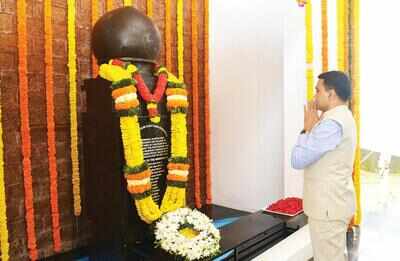Inclusion of Cuncolim Revolt in curriculum gets House nod

The chief minister said oppression by the Portuguese began in 1575 and a number of uprisings by Goans were staged between 1575 and 1583
Margao: A private member's resolution moved by Cuncolim MLA Yuri Alemao on Friday for inclusion of the 1583 uprising by the chieftains of Cuncolim in the curriculum of schools and colleges was unanimously passed by the Assembly.
“The deeds of courage, valiant struggle and sacrifices of Goans, and specially the people of Cuncolim, should be learnt and taught as part of Goa’s political struggle against colonial powers strictly as historical facts without fanning xenophobia of any kind,” read the resolution.
Chief minister Pramod Sawant gave his nod for the resolution to be adopted, but without containing any reference to “xenophobia”, and it was unanimously passed.
Speaking on the resolution, Alemao described it as the first ever non-cooperation movement in Asia, centuries before Mahatma Gandhi launched such a protest against British rule.
Fatorda MLA Vijai Sardesai described the chieftains’ uprising as “a lesson of bravery and sacrifice in defence of the land we live in.”
Members cutting across political divides spoke in favour of the resolution.
Sawant narrated the historical event that led to the martyrdom of 15 of the 16 chieftains as they were shot at by the Portuguese at the now non-existent Assolna fort while one managed to escape by jumping into the river Sal and swimming across it.
“History needs to be placed before Goans. The chieftains’ uprising was a consequence of the oppression of Goans by the Portuguese for refusing to pay land taxes in protest against the colonial rule and resisting religious conversion,” Sawant said.
Delving into history, the chief minister said that oppression by the Portuguese began in 1575 and a number of uprisings by Goans came to be staged between the period 1575 and 1583.
“This particular day in 1583 should, therefore, be observed as Chieftains War Memorial Day. Religious intolerance was at the root of this proselytism. The world had never seen such a revolution against colonial powers before. And that’s why when it came to selecting a day for observing the National War Memorial Day, we opted for this day,” Sawant said.
“The deeds of courage, valiant struggle and sacrifices of Goans, and specially the people of Cuncolim, should be learnt and taught as part of Goa’s political struggle against colonial powers strictly as historical facts without fanning xenophobia of any kind,” read the resolution.
Chief minister Pramod Sawant gave his nod for the resolution to be adopted, but without containing any reference to “xenophobia”, and it was unanimously passed.
Speaking on the resolution, Alemao described it as the first ever non-cooperation movement in Asia, centuries before Mahatma Gandhi launched such a protest against British rule.
Fatorda MLA Vijai Sardesai described the chieftains’ uprising as “a lesson of bravery and sacrifice in defence of the land we live in.”
Members cutting across political divides spoke in favour of the resolution.
Sawant narrated the historical event that led to the martyrdom of 15 of the 16 chieftains as they were shot at by the Portuguese at the now non-existent Assolna fort while one managed to escape by jumping into the river Sal and swimming across it.
“History needs to be placed before Goans. The chieftains’ uprising was a consequence of the oppression of Goans by the Portuguese for refusing to pay land taxes in protest against the colonial rule and resisting religious conversion,” Sawant said.
Delving into history, the chief minister said that oppression by the Portuguese began in 1575 and a number of uprisings by Goans came to be staged between the period 1575 and 1583.
“This particular day in 1583 should, therefore, be observed as Chieftains War Memorial Day. Religious intolerance was at the root of this proselytism. The world had never seen such a revolution against colonial powers before. And that’s why when it came to selecting a day for observing the National War Memorial Day, we opted for this day,” Sawant said.
FOLLOW US ON SOCIAL MEDIA
FacebookTwitterInstagramKOO APPYOUTUBE
Start a Conversation
end of article










